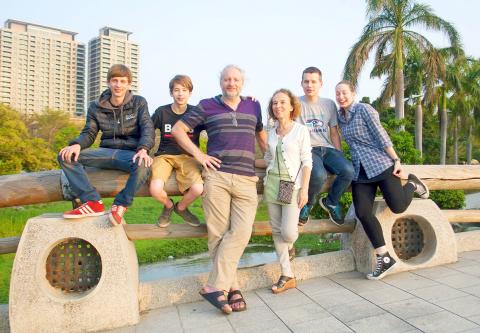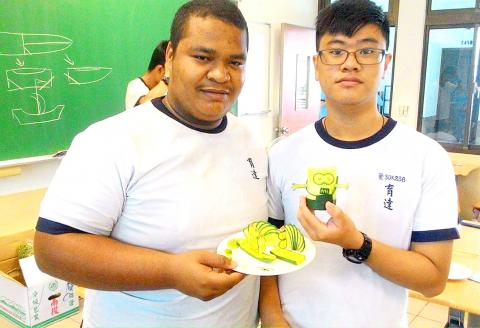Cyril Guedmadingar faces being torn from his family — and the only country he has ever really known. The Russian national wants to stay in Taiwan after high-school graduation and find a job, but the law will not allow him to do so.
Guedmadingar, 18, has lived in Taiwan for 11 years on a dependency visa through his mother, who has an Alien Permanent Residency Certificate (APRC). Since permanent residency is not extended to the immediate family, Guedmadingar can remain in Taiwan as a dependent until he is 26, but cannot work.
“We’re sort of panicking,” his mother Marina says. “He doesn’t want to leave. His entire life is here.”

Photo courtesy of Ralph Jensen
Foreigners not married to Taiwanese could only become permanent residents in 2002, and the problems their children face have only surfaced in recent years as they come of age. Having grown up here, many view themselves as Taiwanese, but do not have citizenship — even if they were born here. They will still have to leave when they are 26, as they cannot become permanent residents because there is a salary requirement.
BARRED FROM WORKING
Now a senior at Yu Da High School of Commerce and Home Economics (育達商職), Guedmadingar’s troubles began when he found work at a restaurant to fulfill the school’s internship requirement.

Photo courtesy of Cyril Guedmadingar
“I worked there for one day, and they asked my school for my work permit,” he says.
He didn’t have one because of his status, and the restaurant told him he could not come back. Luckily, the school gave him the credits anyway so that he could graduate, but he is still unable to work.
Guedmadingar has considered giving up his Russian passport to apply for Taiwanese citizenship, but is not legally able do so until he turns 20, which is next December. But even then, there are strict requirements that are difficult to meet.
Other individuals, such as Andres Jensen, a German-Polish national born in Taiwan, are experiencing similar problems. Also 18, the clock is ticking for Jensen, whose two older siblings have already unwillingly left Taiwan. Jensen is upset that his family was forced to separate, but he’s even more worried about his future.
“I don’t speak German well, and I can’t survive if I go to [Germany],” he says. “It’s kind of sad to realize that Taiwan is my home, but my home doesn’t want me ... I just want to receive a normal salary and live a normal life.”
RESTRICTIVE MEASURES
Attorney Michael Fahey of Taipei-based Winkler Partners says the government didn’t take into consideration the children of permanent residents enacting the new rules.
“It never occurred to them that years later you have people who have children who are growing up,” Fahey says. “The system is not designed to take care of them.”
Although the National Immigration Agency doesn’t track the number of these dependents, Fahey estimates that there are no more than 500.
Fahey partners with Forward Taiwan to work with the government on policy that would help attract and retain foreign talent, and resolving the problems faced by dependents is part of the bigger picture.
Legislators such as Jason Hsu (許毓仁) have taken up the issue, and the National Development Council is drafting a special act for foreign professionals including the residence status of their children, which will be finalized this month at the earliest. It will still have to go through the public hearings before it’s submitted to the legislature.
Andres’s father, Ralph, will be watching carefully, as this is not the first time his family’s plight has received attention. In fact, a 2014 amendment to extend dependency visas was nicknamed the “Krystyna Jensen Act” (雷提娜條款), as it was in response to his daughter’s story of graduating from National Taiwan University of the Arts and being forced to leave because she could not obtain a work permit as a dancer and performer.
The law was enacted so she could stay — but being unable to work, she left anyway. Ralph says the solution would be to have the rights of permanent residents extend to the immediate family.
Fahey is “cautiously optimistic” about the proposed act, but is worried that it will still restrict permanent residency applicants to Class A professional and technical work so that only people who are university graduates will be able to make use of it.
“They need to keep in mind the diversity of these people,” Fahey says.
“It’s true that some of them go to college and do something that allows them to get a job in the technical field. But many of them do other things,” he adds.
And even those who attend college in Taiwan have limited options. Recent laws have made it easier for foreign graduates of Taiwanese universities to receive work permits, but it must be a Class A position. Fahey adds that it would be difficult for them to earn a salary that would qualify for permanent residency.
Guedmadingar may have no problem giving up his passport, but many feel that it is unfair that Taiwan allows its own citizens to be dual nationals while restricting foreigners. In addition, one has to forfeit their passport first, then apply for Taiwanese citizenship — which makes many uncomfortable as there’s a chance they end up stateless.
There is one final less-than-ideal option: Apply for the dependency extension, work illegally and hope things work themselves out.
This is what Kevin (last name withheld to protect his identity) has been doing. Born and raised in Taiwan, Kevin is the only one among his siblings who was young enough to benefit from the 2014 amendment. The rest all left when they turned 20.
“You give them an ARC [Alien Residence Certificate] and they can’t work. You’re basically telling them that you don’t want them in this country,” Kevin says. “I’m working illegally because … that’s what they’ve forced me to do.”
RETAINING TALENT
Fahey believes that diverse talent is the “secret sauce” for Taiwan to transform into a knowledge-based economy, and that controlled immigration is an important part of the solution to the country’s demographic crisis and shrinking workforce.
As such, Taiwan will benefit from retaining these bilingual and bicultural people.
Furthermore, the difficulty of raising a family here will become a deterrent for more experienced professionals, which is the kind of talent that Taiwan wants.
Andres Jensen says that he has met several people in Germany who say they want to move to Taiwan but don’t due to the difficulties with raising a family. And his parents have five or six friends who left after they had children because they didn’t want to deal with the uncertain situation.
Fahey says that in addition to attracting high-level professional talent, the government should focus on people who are already in Taiwan.
“Otherwise they will leave and tell people not to come,” he says. “A lot of people are saying that Taiwan is a great place to live if you’re 20 or 30. But if you have a family it’s not so great … If we have a happy international community, then we will be more likely to attract some of the people they want.”

March 24 to March 30 When Yang Bing-yi (楊秉彝) needed a name for his new cooking oil shop in 1958, he first thought of honoring his previous employer, Heng Tai Fung (恆泰豐). The owner, Wang Yi-fu (王伊夫), had taken care of him over the previous 10 years, shortly after the native of Shanxi Province arrived in Taiwan in 1948 as a penniless 21 year old. His oil supplier was called Din Mei (鼎美), so he simply combined the names. Over the next decade, Yang and his wife Lai Pen-mei (賴盆妹) built up a booming business delivering oil to shops and

Indigenous Truku doctor Yuci (Bokeh Kosang), who resents his father for forcing him to learn their traditional way of life, clashes head to head in this film with his younger brother Siring (Umin Boya), who just wants to live off the land like his ancestors did. Hunter Brothers (獵人兄弟) opens with Yuci as the man of the hour as the village celebrates him getting into medical school, but then his father (Nolay Piho) wakes the brothers up in the middle of the night to go hunting. Siring is eager, but Yuci isn’t. Their mother (Ibix Buyang) begs her husband to let

The Taipei Times last week reported that the Control Yuan said it had been “left with no choice” but to ask the Constitutional Court to rule on the constitutionality of the central government budget, which left it without a budget. Lost in the outrage over the cuts to defense and to the Constitutional Court were the cuts to the Control Yuan, whose operating budget was slashed by 96 percent. It is unable even to pay its utility bills, and in the press conference it convened on the issue, said that its department directors were paying out of pocket for gasoline

On March 13 President William Lai (賴清德) gave a national security speech noting the 20th year since the passing of China’s Anti-Secession Law (反分裂國家法) in March 2005 that laid the legal groundwork for an invasion of Taiwan. That law, and other subsequent ones, are merely political theater created by the Chinese Communist Party (CCP) to have something to point to so they can claim “we have to do it, it is the law.” The president’s speech was somber and said: “By its actions, China already satisfies the definition of a ‘foreign hostile force’ as provided in the Anti-Infiltration Act, which unlike